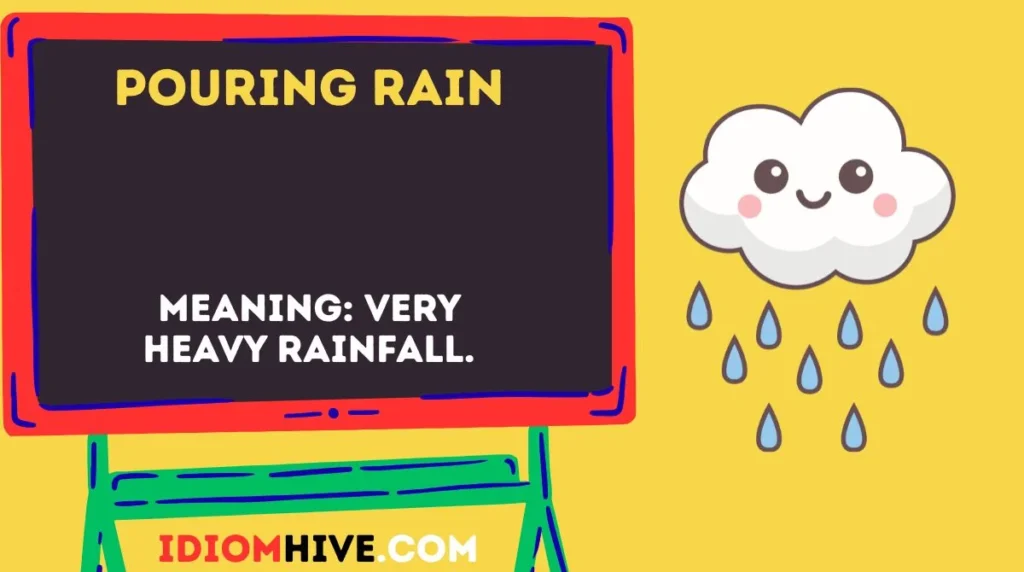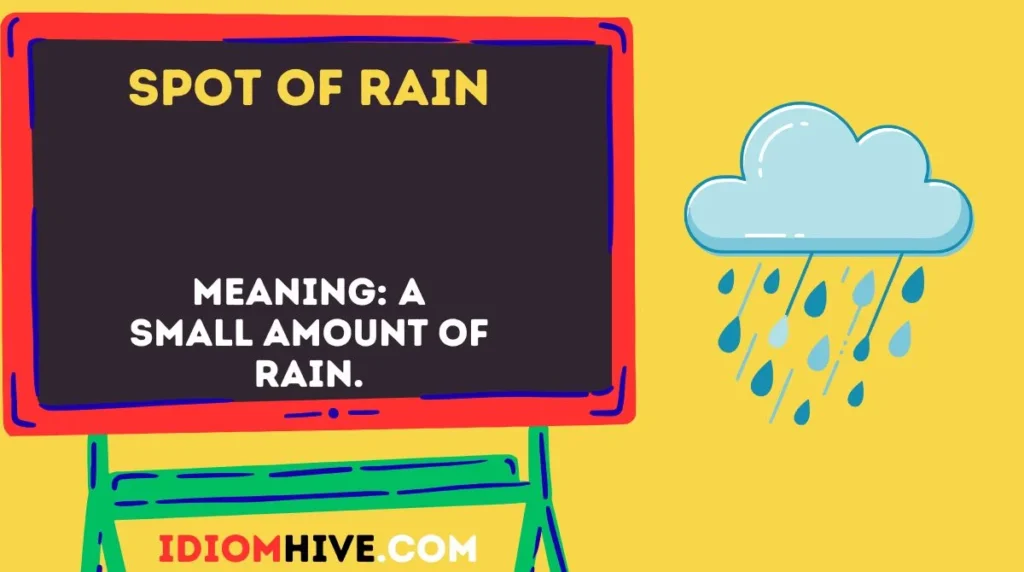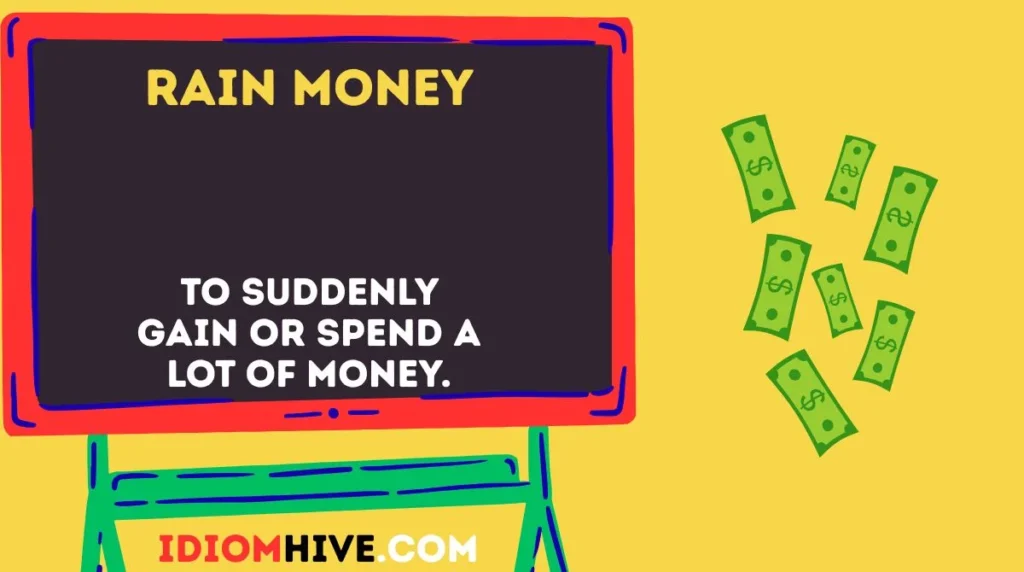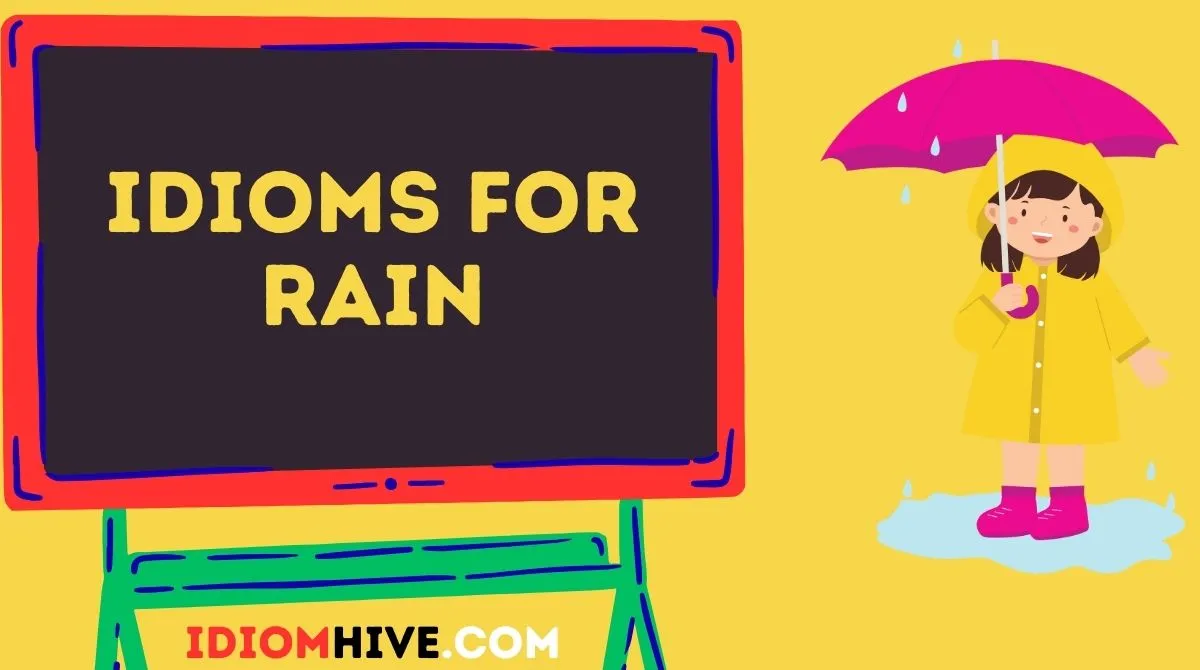Rain has always been more than just water falling from the sky. For centuries, it has inspired poets, storytellers, and everyday speakers to create rich idiomatic expressions. Idioms are colorful phrases whose meanings go beyond their literal words.
They add life, humor, and imagery to conversations, making speech more memorable and expressive. When it comes to “rain,” English offers countless idioms that express emotions, describe situations, or highlight life’s ups and downs.
Learning idioms for rain is especially useful because they appear in casual talk, literature, movies, and even professional communication.
Whether you’re describing heavy downpours, unexpected events, or emotional moods, these idioms will help you sound more fluent and natural in English.
In this article, you’ll explore over 43 rain idioms, each with meanings, examples, alternatives, and practical notes on how to use them.
Did You Know?
The English idiom “It’s raining cats and dogs” has been around since at least the 17th century. One theory suggests it originated from old European myths where cats were linked to rain and dogs to storms. Another theory points to poor drainage in old streets, where heavy rain could wash away debris—including animals.
Idioms About Heavy Rain
It’s Raining Cats and Dogs
Meaning: Raining very heavily.
Example: Don’t forget your umbrella—it’s raining cats and dogs outside.
Alternative: Pouring down.
Note: Common in daily conversations; informal.
Pouring Rain

Meaning: Very heavy rainfall.
Example: The football match was canceled because of the pouring rain.
Alternative: Bucketing down.
Note: Neutral tone; used in both spoken and written English.
Bucketing Down
Meaning: Rain falling extremely hard, as if poured from a bucket.
Example: We waited in the car since it was bucketing down.
Alternative: Lashing rain.
Note: Informal, often British English.
Lashing Rain
Meaning: Rain coming down forcefully, often with wind.
Example: The storm brought lashing rain to the coast.
Alternative: Driving rain.
Note: Poetic and dramatic; good for storytelling.
Rain or Shine
Meaning: No matter what the weather or situation is.
Example: We’ll hold the wedding outdoors, rain or shine.
Alternative: Come hell or high water.
Note: Common in promises or determined statements.
When It Rains, It Pours
Meaning: Problems or events often come all at once.
Example: First I lost my job, then the car broke down—when it rains, it pours.
Alternative: Bad luck never comes alone.
Note: Informal but widely used.
Idioms About Light Rain and Drizzles
A Light Shower
Meaning: A short and gentle rainfall.
Example: We walked home during a light shower.
Alternative: Spot of rain.
Note: Neutral; often used in weather forecasts.
Spot of Rain

Meaning: A small amount of rain.
Example: We might have a spot of rain later today.
Alternative: Sprinkle.
Note: British English, often casual.
A Sprinkle
Meaning: A very light rainfall.
Example: The kids kept playing despite the sprinkle.
Alternative: Drizzle.
Note: Informal, everyday usage.
Drizzle Down
Meaning: Slow and soft rain falling.
Example: It drizzled down all morning, making the roads slippery.
Alternative: Misty rain.
Note: Used in descriptive or narrative writing.
Dancing in the Rain
Meaning: Enjoying life despite difficulties.
Example: She believes in dancing in the rain instead of waiting for the storm to pass.
Alternative: Make the best of it.
Note: Motivational and metaphorical.
Idioms About Unpredictability and Life Lessons
Save for a Rainy Day
Meaning: To save money or resources for future trouble.
Example: You should put some money aside for a rainy day.
Alternative: Better safe than sorry.
Note: Common in financial advice; formal and informal.
Right as Rain
Meaning: Completely fine or healthy again.
Example: After a good rest, you’ll be right as rain.
Alternative: Back on track.
Note: Friendly, reassuring tone.
Chasing Rainbows
Meaning: Pursuing unrealistic dreams.
Example: Investing in that scheme is like chasing rainbows.
Alternative: Building castles in the air.
Note: Cautionary, often informal.
Rain Check
Meaning: Postponing an invitation or plan.
Example: Can I take a rain check on dinner tonight?
Alternative: Let’s reschedule.
Note: Casual, polite refusal.
Into Each Life Some Rain Must Fall
Meaning: Everyone faces difficulties at some point.
Example: Don’t be discouraged—into each life some rain must fall.
Alternative: Every cloud has its silver lining.
Note: Literary and reflective.
Come Rain or Shine
Meaning: Something will happen no matter the situation.
Example: He runs five miles every morning, come rain or shine.
Alternative: No matter what.
Note: Determined tone; motivational.
A Rain of Compliments
Meaning: Receiving a lot of praise.
Example: The singer received a rain of compliments after her performance.
Alternative: Showered with praise.
Note: Positive and expressive.
Idioms About Storms and Emotions
A Storm in a Teacup
Meaning: A small issue blown out of proportion.
Example: Their argument was just a storm in a teacup.
Alternative: Making a mountain out of a molehill.
Note: British English; everyday use.
Under the Weather
Meaning: Feeling unwell.
Example: I’m a bit under the weather today.
Alternative: Feeling off-color.
Note: Casual, very common.
Steal My Thunder
Meaning: Take attention or praise away from someone.
Example: Her big announcement stole my thunder at the meeting.
Alternative: Upstage someone.
Note: Used in both professional and informal settings.
Lightning Fast
Meaning: Very quick.
Example: He gave a lightning-fast reply to the email.
Alternative: In a flash.
Note: Popular in sports and technology contexts.
Eye of the Storm
Meaning: Being in the center of trouble or crisis.
Example: The politician found himself in the eye of the storm.
Alternative: Middle of chaos.
Note: Journalistic and formal use.
Calm Before the Storm
Meaning: A quiet period before major trouble begins.
Example: The office was silent, a calm before the storm of deadlines.
Alternative: Temporary peace.
Note: Figurative, descriptive.
Ride Out the Storm
Meaning: Survive or endure difficulties.
Example: The company rode out the storm during the recession.
Alternative: Weather the storm.
Note: Formal and informal; resilience-focused.
Weather the Storm
Meaning: To overcome a difficult situation.
Example: With teamwork, we can weather the storm.
Alternative: Hold on through tough times.
Note: Popular in motivational talks.
Idioms Mixing Rain with Luck and Opportunities
Rain Money

Meaning: To suddenly gain or spend a lot of money.
Example: It’s raining money for investors this year.
Alternative: Cash flow.
Note: Informal and dramatic.
Come in Out of the Rain
Meaning: To stop doing something foolish.
Example: It’s time to come in out of the rain and get serious about your future.
Alternative: Wake up to reality.
Note: Advising tone; informal.
Raining on Someone’s Parade
Meaning: To spoil someone’s happiness.
Example: I don’t want to rain on your parade, but the plan won’t work.
Alternative: Burst someone’s bubble.
Note: Common in daily talk.
Waiting for the Rain to Stop
Meaning: Hoping for a problem to end before acting.
Example: Instead of waiting for the rain to stop, she launched the project.
Alternative: Waiting for the perfect time.
Note: Motivational, reflective.
A Rainmaker
Meaning: A person who brings in business or success.
Example: She’s the company’s top rainmaker, attracting big clients.
Alternative: Big player.
Note: Professional and business contexts.
How to Use These Idioms in Daily Life
- Speaking: Use rain idioms in casual chats to sound fluent, e.g., “It’s raining cats and dogs today!”
- Writing: Enrich essays, stories, or even social media posts with idioms like “right as rain” to add flair.
- Professional Usage: In presentations or workplace discussions, idioms such as “weather the storm” or “rainmaker” make your language more persuasive and memorable.
Common Mistakes Learners Make with Idioms
- Wrong: It’s raining cats with dogs.
Correct: It’s raining cats and dogs. - Wrong: I’ll give you a rain check tomorrow.
Correct: Can I take a rain check on tomorrow’s plan? - Wrong: She is raining compliments.
Correct: She received a rain of compliments.
Frequently Asked Questions
1. What does “rain check” mean?
It means postponing an invitation or event. Common in American English.
2. Can rain idioms be used in formal writing?
Yes, but choose appropriately. Phrases like “weather the storm” or “rainmaker” work well in professional contexts, while “raining cats and dogs” is more informal.
3. Are rain idioms common in British and American English?
Yes, though some, like “storm in a teacup,” are more British, while “rain check” is mainly American.
4. How many rain idioms exist in English?
There are dozens, and new creative phrases appear regularly in literature, music, and media.
5. Can I use idioms in exams?
Yes, if they fit naturally. Idioms can make your writing or speaking more engaging, but avoid forcing them.
Conclusion
Rain inspires countless idioms that color the English language. From describing heavy showers (“raining cats and dogs”) to expressing resilience (“weather the storm”), these expressions bring creativity and clarity to communication.
By learning and practicing them, you can sound more natural, fluent, and expressive in English. So the next time life brings a drizzle, downpour, or even a storm, remember—there’s always an idiom to describe it, and perhaps a rainbow waiting on the other side.










